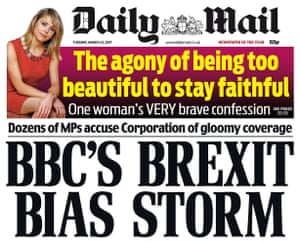
When even the BBC’s Countryfile, the sleeper Sunday night hit much beloved of weather watchers, is accused of “cropaganda” by the Daily Mail, the corporation knows it is in the eye of a storm.
A report this week about a strawberry grower’s fears over his seasonal workforce was yet __more evidence that the corporation is giving too much airtime to “Bremoaners”, when readers of the Daily Mail and other newspapers know that a post-Brexit Britain will be all sunshine and daffodils.
It wasn’t that long ago that Countryfile, a show regularly watched by 9 million a week, was accused by the Daily Mail of being TOO “relentlessly positive and upbeat” about the reality of life in the country due to its focus on pretty animals and flowers. Such pre-referendum views now seem as out of date as a Labour party with an imminent chance of governing.
Which is partly the point of course. Both the timing and nature of the attacks on the BBC on Tuesday say __more about our current political climate and vogue for blaming the messenger than any magazine report about farming.
It is telling that the letter signed by 70 MPs which accused the corporation of being overly gloomy about Britain’s post-Brexit future landed on the front pages of the Mail and the Telegraph on the day after the government announced next week’s date to discuss article 50 and therefore trigger Brexit.
With a slim majority and vexed talks looming, it is not a Labour party locked in bitter internal squabbles that Brexiteers fear, but the media. And in particular the news organisation that is committed to “impartiality” by the terms of its royal charter and that regularly tops the polls for most trusted news organisation.
Hence, on the day after the article 50 date was set, the Mail’s front page screamed: “Brexit Bias Storm: dozens of MPs accuse Corporation of gloomy coverage.” The top of page two reported on the “viewers” accusing Countryfile of “anti-Brexit propaganda” alongside a table of other “questionable coverage” on the BBC.
The Telegraph splashed on the BBC warning over its bias and followed up with a leader which said: “Brexit Britain deserves better from the BBC.”
This leader even described the BBC coverage as presenting a “diplomatic risk” as “EU leaders might be persuaded by the BBC to mistakenly overestimate Britain’s regrets about Brexit, holding out hope we will change our minds”. Which says something for our negotiations with the EU if their leaders are forced to watch the BBC to understand where the UK stands.
The letter, coordinated by Julian Knight – a man whose job as a former journalist at the BBC would surely seem to preclude his current role as a Tory MP – was addressed not just to director general Tony Hall but also to the BBC’s incoming chairman, David Clementi, who has already talked about the importance of policing the BBC’s impartiality.
The BBC might have its funding more or less fixed for 10 years – barring any unforeseen Treasury snatch – but it will always be subject to political pressure, especially when public opinion is so finely split on a hugely important issue.
But there is something more than classic political pressure going on here.
Knight’s letter, also signed by several Labour MPs, is the latest example of the cross-party game du jour of blame the messenger.
On the same day as the bias story splashed the papers, Ken Livingstone appeared to blame the media for Jeremy Corbyn’s poor poll ratings on Radio 4’s Today programme. Just like it was to blame, he said, for Neil Kinnock’s failure to win an election.
Corbyn has not yet appeared as a lightbulb on a tabloid front page but the big difference between now and 1992 seems to be that Kinnock and his supporters were not constantly calling out the media every time it reported something they disagreed with.
Nicky Morgan (@NickyMorgan01)Another attempt by leading Brexiteers to silence those whose coverage & questions they don't like #chilling https://t.co/MSbEGnQNL4
March 21, 2017
This is a not a party political point, but a cultural one. Witness the similarities between the tweeted support for the BBC by both deputy Labour leader Tom Watson and former Conservative minister Nicky Morgan.
Morgan’s “Another attempt by leading Brexiteers to silence those whose coverage & questions they don’t like #chilling” was better received by her followers than Watson’s comments in support of the BBC, tweeted by the Labour press team, which prompted one follower to respond that the BBC was run by “middle class New Labour lovey’s” [sic].
Such messenger blaming has been given the most powerful backing by the US president of course, who has risen to power by recognising that raising doubts about facts means you can call genuine questions about your policies lies promulgated by biased reporters.
Tony Hall’s reply to Julian Knight said that “it is more important than ever that the BBC’s journalism is independent of political pressure” in “consequential times”.
Brexit and the referendum will have far-reaching consequences for the UK, but so will the constant undermining of the media. If our political leaders continue to describe every report they disagree with as evidence of bias, the truth is that our future really will be gloomy.